Joe Biden meets UK PM accompanied by ‘nuclear briefcase’ amid cluster bombs concern
In a clear message to Vladimir Putin, America’s ‘nuclear football’ briefcase has been carried out of Downing Street after Joe Biden paid Rishi Sunak a visit.
World
Don't miss out on the headlines from World. Followed categories will be added to My News.
America’s “nuclear football” briefcase was seen being carried out of Downing Street on Monday, local time, after US president Joe Biden paid UK Prime Minister Rishi Sunak a visit. The black leather briefcase followed closely behind the president as he left Downing Street, according to The Sun, and was intended to send a clear message to Russian leader Vladimir Putin. The “nuclear football” refers to the briefcase which accompanies the president while he’s away from the White House, should be need to deploy nuclear weapons if necessary.
Mr Biden met with Mr Sunak for tea before meeting King Charles III, and going on to a NATO summit in Lithuania, which will consider granting membership to Ukraine.
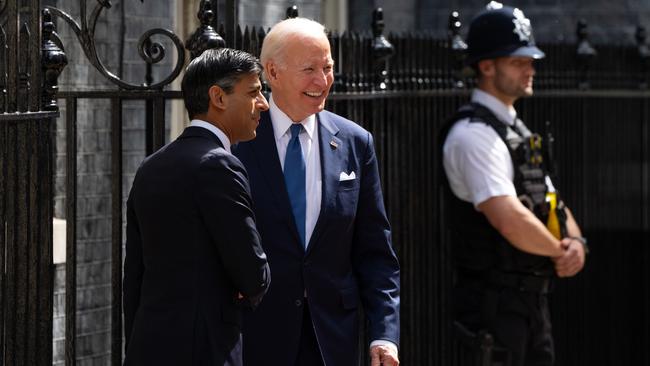
The summit has been made more precarious given Russia’s continued threats to use nuclear weapons in Ukraine.
Biden offered a sobering comment on the potential of nuclear escalation in the Ukraine war on Thursday. He said: “I don’t think there’s any such thing as the ability to easily use a tactical nuclear weapon and not end up with Armageddon.”
Yet as he flounders in Ukraine, Putin has boasted about having “more nuclear missiles than NATO countries”, and told the west to “go to hell” in response to pleas to not send weapons to Belarus.
In October, Mr Biden warned: “Putin’s not joking when he talks about potential use of tactical nuclear weapons or biological or chemical weapons because his military is, you might say, significantly under performing.” Biden continued: “This is the first time since the Cuban missile crisis that we have the threat of a nuclear weapon if in fact things continue down the path they are going.”
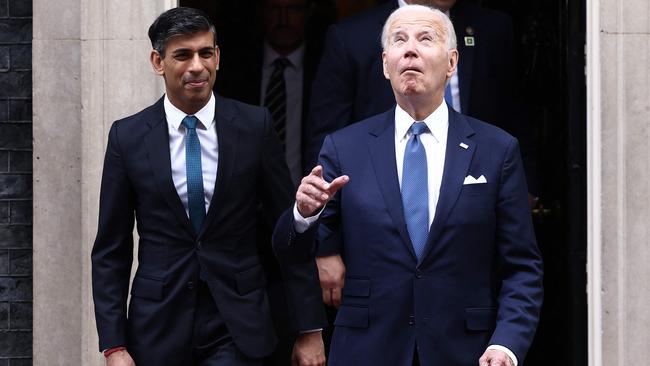
Russia has already moved nuclear missiles to Belarus, with puppet President Alexander Lukashenko saying he won’t hesitate to use them.
The deployment of weapons in Belarus marks the first time Russia has moved weapons outside of their borders since the fall of the Soviet Union.
Russian opposition leader and Putin enemy Grigory Yavlinsky made it clear that Vladimir Putin’s threats of nuclear Armageddon between the East and West are “serious”.
Yavlinsky, a former Soviet-era powerbroker and founder of Russia’s last liberal party, told The Sun: “Taking into account the size of the threat of nuclear war - this is all so serious.”
Putin is emerging from the instability of an attempted coup, and the danger of a weakened despot “must be taken into account”. The “threat” isn’t just for Ukraine, Yavlinsky warned, but a nuclear apocalypse “between the East and West”.
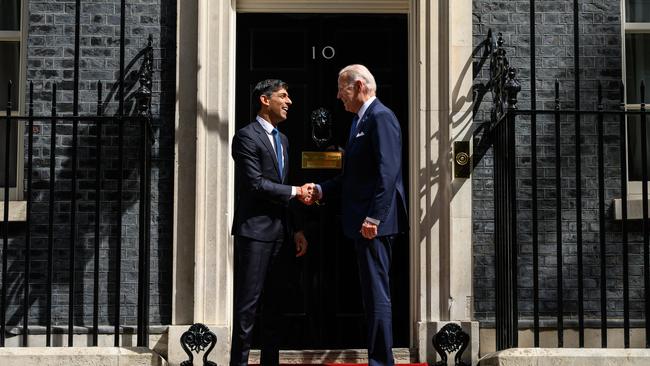
It comes as Mr Biden landed in the UK for the start of a three-nation tour amid concerns over his calls to send cluster bombs to Ukraine. However, the UK and Canada are among those who have voiced concern about supplying the bombs, which are banned by 100 countries including the UK.
But the US said the weapons are needed because Ukraine’s stocks are dwindling.
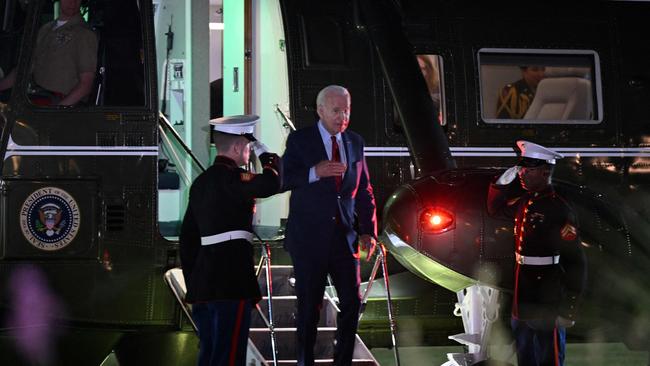
BIDEN VISIT AMID CLUSTER BOMBS FRACAS
Mr Sunak hasn’t directly criticised Mr Biden following Friday’s cluster bomb announcement, but on Saturday he said that the UK was one of 123 countries signed up to the Convention on Cluster Munitions, an international treaty which bans the production or use of the weapons.
Meanwhile, other US allies like New Zealand saying on Sunday the munitions could cause “huge damage to innocent people”.
Cluster bombs typically release lots of smaller bomblets that can kill indiscriminately over a wide area. Unexploded bomblets can linger on the ground for years before they detonate.
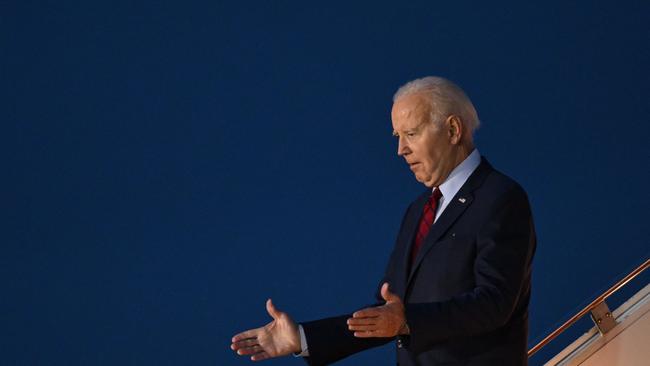
The US says it has received written reassurances from Kyiv that Ukrainian troops will not use the weapons in Russia or in urban areas.
However, UK chair of the defence select committee Tobias Ellwood warned it could cost the “high moral ground” for Ukraine’s backers.
“And that could easily see this international coalition of support for Ukraine start to crumble away, because many people will be deeply concerned that we’re using munitions which have been outlawed,” Mr Ellwood told GB News.
While in the UK, Mr Biden will also meet King Charles for the first time since the King was crowned.
YOUNG UKRAINIANS PARTY AS THEY REPAIR RUINS
To the sound of club beats, hundreds of young Ukrainians swarmed over the ruins of bombed-out homes in several villages in the north of the country this weekend.
The gathering in the Chernigiv region was no ordinary party but part of an initiative for volunteers to help clear away debris and rebuild their country.
“This is an example of how young people can be useful, while not compromising the way we like to spend our time listening to music,” said Dmytro Trofymenko, a DJ.
“We’re cleaning up the consequences of Russian occupation,” said the 31-year-old as volunteers dressed to party formed a human chain to carry away bricks from a ruined building.
The initiative called Repair Together started out last year and has been active in different parts of Chernigiv that were either under Russian control or on the front line for several weeks.
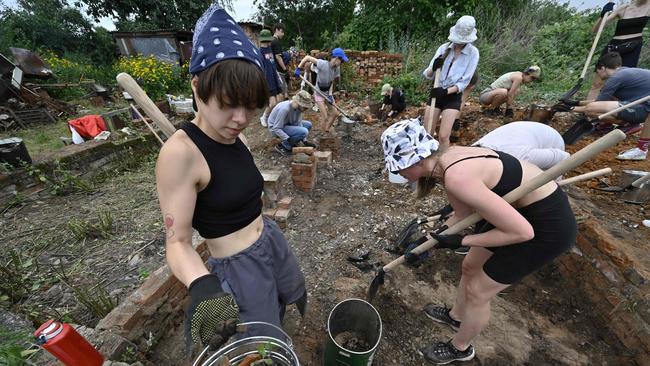
“We communicate with the local authorities. They give us a list of buildings and addresses that need to be dismantled,” said Bogdan Bieliaiev, 29, one of the organisers.
Professional builders then get to work once the debris has been cleared away.
There are regular outings in the summer and most of the volunteers come from the capital Kyiv or the surrounding region.
Bieliaiev estimated up to 350 people were taking part in this weekend’s gathering and the average age was around 25.
“Most of them want to help. They don’t want to be at home,” he said.
Oleksandra Horgan, a 28-year-old agriculture expert wearing sunglasses and a leopard-print kerchief on her head, said she was “inspired by patriotism”.
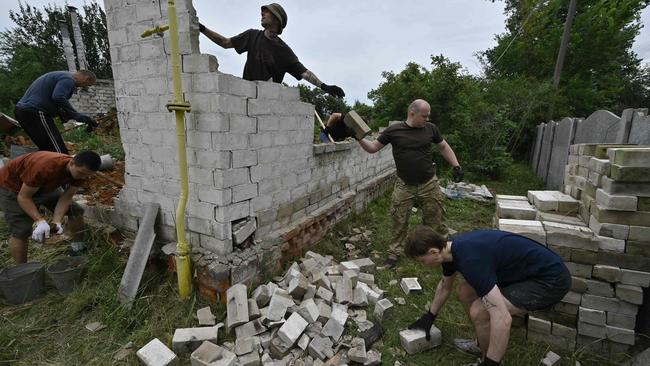
“Unfortunately, my hometown is currently occupied. I cannot physically help them, only financially. I feel like somehow, this way, I’m making up for it,” she said.
Yaryna Kvasnii, 21, said: “Sometimes you want to help people with your hands. Plus it benefits the community. They don’t need to hire anyone, just proactive young people who will do it for free.”
After a hard day’s work, the volunteers took time to relax, joining in celebrations for the folk tradition of Kupala Night — usually held on the day of the summer solstice.
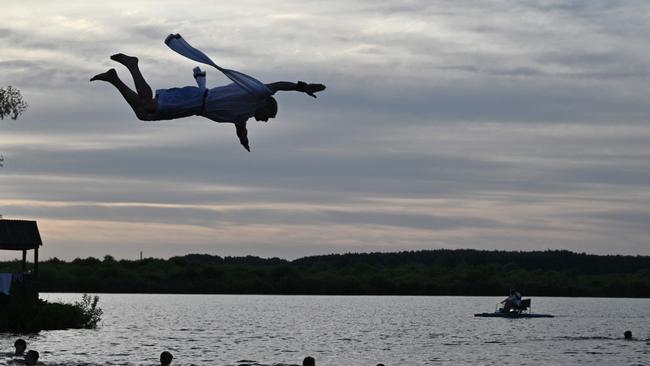
The volunteers stripped down and took a dip in a nearby lake, some of them wearing embroidered linen shirts and elaborate crowns made of flowers.
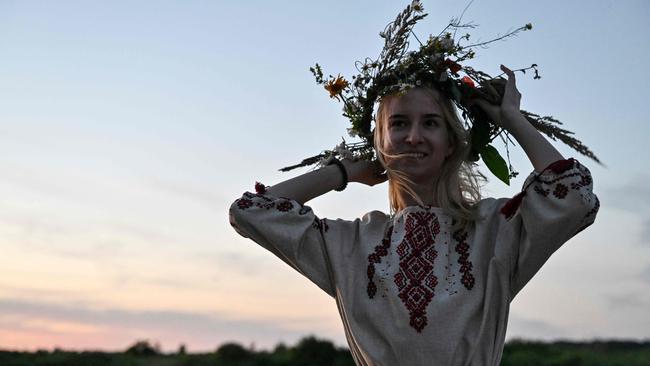
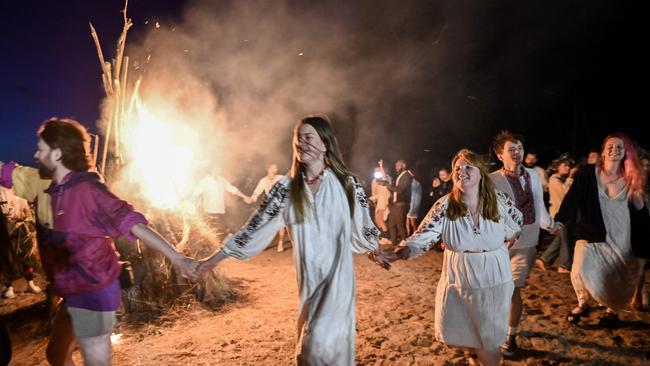
Later, they danced around a fire.
Anna Pendyukh, a 30-year-old graphic designer, said the gatherings were a way of getting rid of “a lot of negativity”.
“It’s non-stop outdoor fitness, company, people, socialising. It’s very important in wartime, it supports mental health.” “You just want to rip your hair out because of what is happening. This negativity needs to be released somewhere, to be spat out.
“This is the most constructive, non-destructive way to do that,” she said.
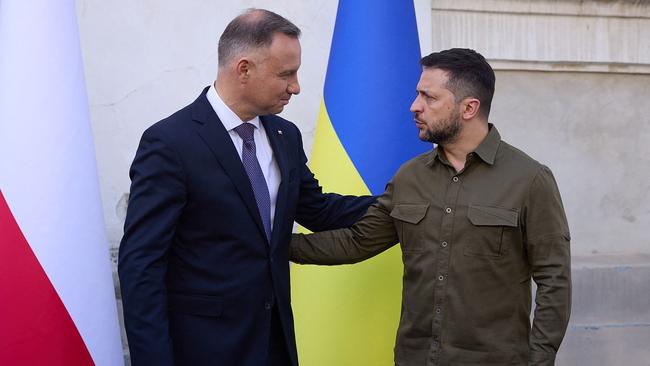
ZELENSKYY PINS HOPES ON NATO SUMMIT
Ukrainian President Volodymyr Zelenskyy on Sunday voiced hope for the “best possible result” from an upcoming NATO summit where Kyiv is hoping for a clear signal that it could one day join the alliance.
After meeting his Polish counterpart Andrzej Duda, Zelensky said the two discussed the summit starting in Vilnius on Tuesday and agreed to “work together to get the best possible result for Ukraine”.
Poland is one of Ukraine’s biggest supporters within NATO and has said it wants “security guarantees” for the country from other NATO members.
Zelenskyy has said he does not expect Ukraine to actually join NATO until after the war but he hopes the summit will give a “clear signal” on the intention to bring Ukraine into the alliance.
US President Joe Biden, who set off on Sunday for Britain on his way to the NATO summit, said he hoped the military alliance leaders would “lay out a rational path for Ukraine to be able to qualify to be able to get into NATO”.
Speaking to CNN, he said there were also “other qualifications that need to be met, including democratisation”.
“I don’t think there is unanimity in NATO about whether or not to bring Ukraine into the NATO family now, at this moment, in the middle of a war,” he added.
Bringing Ukraine in now, Biden said, would mean “war with Russia” because of the NATO commitment to collective defence.
Zelenskyy returned from Turkey on Saturday after a regional tour to drum up support ahead of the summit with Western allies, who have pledged billions in military aid.
Zelensky last week also won a US pledge for cluster munitions that could inflict significant damage to Russian forces.

EIGHT KILLED IN RUSSIAN ROCKET FIRE
Eight people were killed and 13 injured in Lyman in eastern Ukraine after the town came under Russian rocket fire after Ukraine President Volodymyr Zelensky arranged repatriation of several commanders from Turkey to boost his counteroffensive.
The unexpected attack caught people by surprise with some victims blown from their bikes as they cycled.
“So far we know about 8 dead … The number of injured has increased to 13 people,” the ministry said on social media.
The strikes hit around 10am (0700 GMT) at two intersections that were busy with pedestrians, witnesses told AFP.
A residential building, an annex to a printing house and three cars were set on fire in the attack, the ministry said.
AFP journalists arriving on the scene in the afternoon saw three charred vehicles in front of an car supply store.
Traces of blood were visible at both intersections.
“There were explosions everywhere, I didn’t know where to hide,” Nadya Bereinaya, 69, told AFP.
“Today is Saturday, so there was a lot of people.” Pavlo Kyrylenko, governor of the Donetsk region where Lyman is located, said “the Russians struck the town with multiple rocket launchers”.
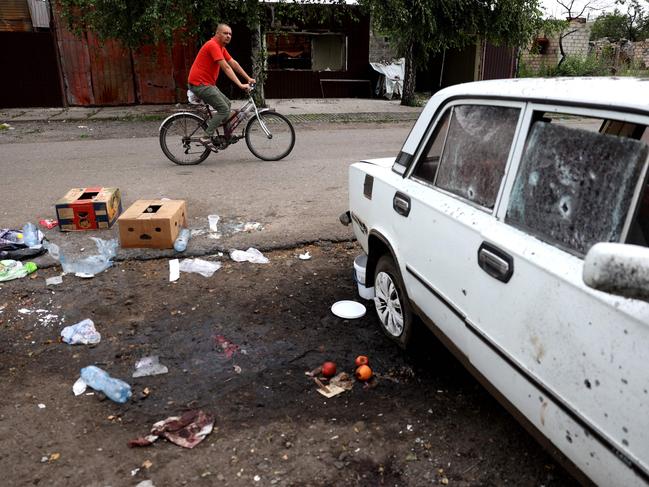
Lyman, a major rail hub, was initially captured by Russian forces but then retaken by Ukraine’s army in October.
Ukraine has reported Russian offensive operations in the area this week.
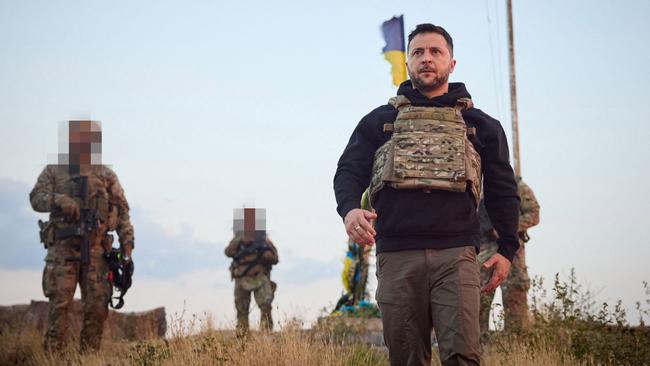
Zelensky published on social media an undated video clip of a visit to Snake Island in the Black Sea – a symbol of Ukraine’s defiance against Russia.
“Today we are on Snake Island, which will never be conquered by the occupiers, like the whole of Ukraine, because we are the country of the brave,” he said.
“I want to thank from here, from this place of victory, each of our soldiers for these 500 days,” he said in the video, which showed him arriving on the island by boat and leaving flowers.
The UN has documented 9,000 civilian deaths since the start of the war on February 24, 2022, including 500 children, although it estimates the real toll could be significantly higher.
‘ACT OF DESPERATION’
Zelensky on Saturday completed a visit to Turkey in which he secured backing for his country’s NATO aspirations after winning a US pledge for cluster munitions that could inflict significant damage on Russian forces on the battlefield.
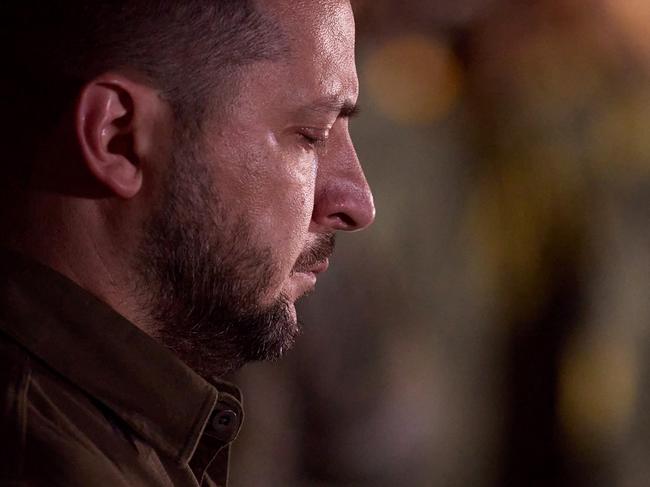
US President Joe Biden admitted that supplying Ukraine with weapons that are capable of covering several football fields with hundreds of multiple small explosives was “a difficult decision”.
Humanitarian groups strongly condemned the decision to supply cluster munitions, which can go undetonated and potentially endanger civilians for years to come.
Russia, which itself uses cluster munitions in Ukraine, also criticised the decision on Saturday saying it was an “act of desperation” that would have “no effect” on the conflict.
Russian foreign ministry spokeswoman Maria Zakharova also said Ukraine’s assurances it would use the ammunition responsibly “are not worth anything”.
‘CONTACT IS POSSIBLE’
Various international efforts to mediate in the conflict have so far failed. Turkish President Recep Tayyip Erdogan has tried to portray himself as a neutral mediator, substantially boosting wartime trade with Russia while supplying Ukraine with drones and other weapons.
But while reaffirming his longstanding call for both sides to enter peace talks, Erdogan risked drawing Russia’s ire by delivering unequivocal support for Ukraine’s NATO aspiration.
“There is no doubt that Ukraine deserves membership of NATO,” Erdogan told reporters in Istanbul.
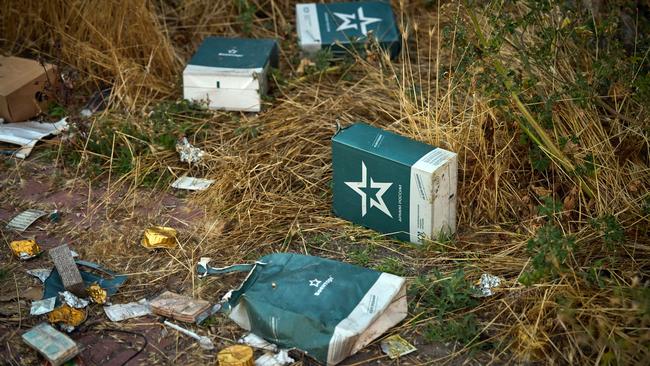
Erdogan also said he would meet Russian President Vladimir Putin next month on what would be the Kremlin chief’s first visit to Turkey since the invasion.
Asked about a possible meeting with Erdogan, Kremlin spokesman Dmitry Peskov was quoted by Russian news agencies on Saturday as saying: “Contact is possible. There are no fixed dates yet.”
KREMLIN SLAMS ZELENSKY MOVE
The Kremlin on Saturday slammed Ukrainian President Volodymyr Zelensky’s decision to repatriate several Ukrainian commanders who should have remained in Turkey until the end of the conflict under a deal.
The Ukrainian presidency confirmed that it had secured the return of members of the crack Azov regiment, which is despised in Russia, after “negotiations with the Turkish side”.
“The return of Azov commanders from Turkey to Ukraine is nothing but a direct violation of the terms of existing agreements,” Kremlin spokesman Dmitry Peskov was quoted as saying by Russian news agencies.

He said both Ukraine and Turkey had violated the terms of the agreement, under which the men were supposed to remain in Turkey until the end of the conflict.
Peskov said the return was linked to the “failure of the counter offensive” launched by Ukraine, and Ankara’s desire to show its “solidarity” ahead of a July 11-12 NATO summit in Vilnius.
“Preparations for the NATO summit are underway and of course there has been a lot of pressure on Turkey,” he said.
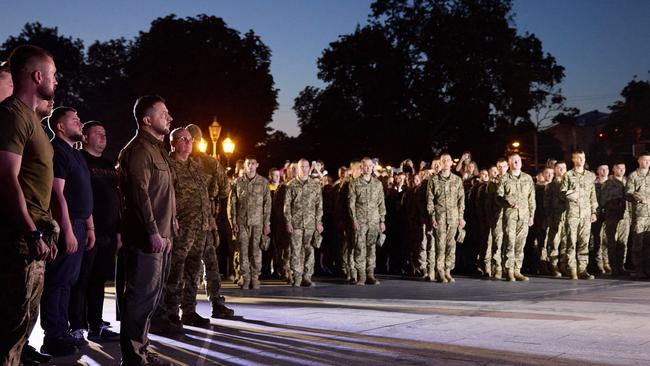
Part of the Azov regiment of the Ukrainian army, formed on the basis of the ultranationalist battalion of the same name, was captured by Russian forces after the fall of Mariupol in May 2022.
Celebrated as heroes in Ukraine for their stiff resistance within the Azovstal factory during the siege of Mariupol, Azov’s fighters are reviled in Russia for their links with Ukrainian ultranationalists.
More Coverage
Originally published as Joe Biden meets UK PM accompanied by ‘nuclear briefcase’ amid cluster bombs concern




